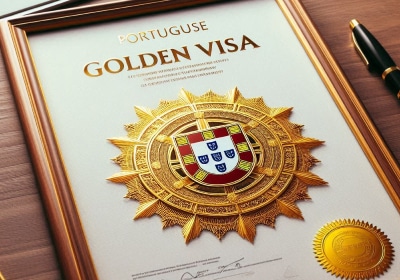
The Portugal D7 Visa and Golden Visa are two extremely popular schemes that help foreigners move to and settle in Portugal.
The D7 Visa mainly targets foreigners with stable, passive earnings sourced from pensions, rental income, and investment dividends who want to acquire a Portuguese residence permit. On the other hand, the Portugal Golden Visa program requires applicants to invest significantly in the country in exchange for residence
Both options grant applicants a residence permit in Portugal and allow eligible holders to seek permanent residence and Portuguese citizenship and bring their family members to the country. However, when analyzing the D7 Visa vs Golden Visa Portugal, you’ll notice that their requirements differ.
The article provides essential information and highlights the key differences between the D7 Visa and Golden Visa. Here, you’ll learn:
About the D7 Visa and Golden Visa Portugal
What is the Portugal D7 Visa?

Targeted at contractors, retirees, and individuals with consistent passive income streams, the D7 Visa allows applicants to leverage various income sources. Eligible funds can include pensions, financial investments, rental income, and earnings from intellectual property, among others.
Introduced by the Portuguese government in 2007, the D7 Visa offers non-EU, EEA, and Swiss citizens an opportunity to establish residency in Portugal based on their regular passive income. This visa is particularly popular among retirees looking to create a home in Portugal while enjoying the country’s high quality of life and appealing landscapes.
What is the Portugal Golden Visa?
The Portuguese Golden Visa program, officially known as the Portugal Golden Residence Permit Program, was established in 2012 to attract foreign investment and enhance Portugal’s appeal to non-EU nationals. This initiative allows individuals to obtain residency through various qualifying investments.
Structured as a five-year residency by investment scheme, Portugal Golden Visa enables investors and their family members to secure residence permits while contributing to the country. Qualifying investment options include capital transfers, job creation, and investment in Portuguese companies, offering flexibility to meet different investor interests.
What are the similarities between the D7 Viva and Golden Visa Portugal?
The D7 Visa and the Portuguese Golden Visa are both attractive programs, especially for UK citizens and Americans moving to Portugal. Some of the key advantages that both programs offer include:
Pathway to permanent residence and Portuguese citizenship: After five years of legal residency in Portugal, you may become eligible for either permanent residency or citizenship, allowing you to obtain a Portuguese passport.
It’s important to note that the citizenship application process requires passing a basic Portuguese language test. This ensures that applicants have a fundamental understanding of the language and can effectively integrate into Portuguese society.
Attractive tax benefits: As a holder of either the Portugal D7 Visa or the Golden Visa, you may be eligible for the Non-Habitual Residency (NHR) scheme, which offers reduced tax rates on income for ten years. While the NHR program is largely closed to new applicants, eligibility criteria have become stricter.
Family reunification: The Portugal Golden Visa and the D7 Visa allow your dependent family to be included in the application and have the same opportunities in a safe and stable country.
Both visas permit you to include your spouse or legal partner, children under 18 years of age, children of age provided that they are single, financially dependent, and enrolled as full-time students, and parents of the main applicant or their spouse/partner must be financially dependent.
Free movement within the Schengen Area: With the D7 and Portugal’s Golden Visa, you can freely enter and move within the 27 countries in the Schengen Area without needing an additional visa.
Residency rights and access to services: With the temporary residency permit, you and your family will have access to Portuguese state healthcare, and your children can enroll in the public education system, ensuring essential services for your family’s well-being.
No active business involvement: The Portugal D7 Visa and the Golden Visa do not require individuals to establish or manage a business in Portugal.
What are the differences between the D7 Visa and the Golden Visa in Portugal?
Now that we’ve explored the common elements between the D7 Visa and the Portugal Golden Visa, it’s important to discuss their distinct features to help you determine which option best suits your needs and circumstances.
In this section, we’ll examine the five key differences that set the D7 Visa apart from the Golden Visa, and these include:
1. Required time spent in Portugal

The Portugal D7 Visa is valid for two years. During this time, permit holders cannot leave the country for six consecutive months or eight months during the two years.
If you renew the D7 Passive Income Visa, your new residency card will be valid for three years. During those three years, residency card holders cannot leave the country for six following months or eight months in total.
For Golden Visa holders, on the other hand, the annual requirement is to spend an average of seven days in Portugal.
In essence, the Portugal D7 Visa is ideal for applicants who are prepared to live for 1.5 years in a row or 16 months within two years in Portugal and be tax residents in the country. On the other hand, Golden Visa holders must be present in Portugal for only seven days a year and do not have tax residency requirements.
2. Income requirements
The two visas also significantly differ regarding income requirements and capital investment pathways.
For the Portugal D7 Visa, you will not be required to invest in Portugal, but you must show proof of stable passive income. This stable passive income can be from movable property, rental income, real estate, intellectual property, or financial investments.
The requirements for the D7 Retirement Visa are as follows:
- Be a non-EU national
- Earn a monthly passive income of at least €820.00 (this can be foreign income and can come from pensions, transferable equity, property rental, intellectual property, or financial equity)
- Show proof of a place to live in Portugal
- Be willing to reside for more than 183 consecutive days per calendar year in Portugal
However, applications may be denied if you just meet the minimum requirement. Demonstrating passive income of at least twice the minimum requirement is safer. The Portuguese Consulate accepts a combination of salary, pension and benefits, and investments, including new real estate income. Your passive income must be consistent and marked or documented in your bank account and financial statements to qualify.
For the Portugal Golden Visa program, a minimum investment of at least €250,000 is needed, but it is common for people to opt for the €350,000 or €500,000 pathways.
Investment options for the Golden Visa include:
Fund
subscription
Donation in the arts or reconstruction
Scientific
research
Creation
of ten jobs
Share capital
and job creation
- Fund subscription: Contribute to a Golden Visa investment fund, such as a venture capital or private equity fund, worth at least €500,000
- Investment or donation in the arts or reconstruction of national heritage with a donation of at least €250,000 or €200,000 in a low-density area
- Scientific research: Science or Technology research contribution of at least €500,000
- Creation of ten jobs: Creation and maintenance of ten jobs during the required period
- Share capital and job creation: Incorporation of a company or reinforcement of a company’s share capital, in either case with an investment of €500,000, combined with the creation of five or maintaining ten jobs (5 of them permanent)
3. Application processes
The Portugal D7 Visa application process is more complex than the Golden Visa. Before initiating the application process at a Portuguese Consulate in your home country, you must first acquire your Portuguese tax number (NIF), open a Portuguese bank account, and arrange accommodation in Portugal. Once the visa is granted for four months, the applicant must travel to Portugal to apply for the initial residence permit.
In contrast, obtaining the Golden Visa is simpler, as investors are not obligated to provide proof of accommodation. The application can be submitted following the completion of the necessary investment, and the entire procedure can be conducted remotely. However, applicants are advised to choose a Portugal-based representative to help them get a Portugal NIF number and open a Portuguese bank account.
4. Tax status and requirements

This updated scheme imposes stricter requirements than the now phased-out NHR tax regime, necessitating applicants to earn income in specific fields such as scientific research, IT, tourism, audiovisual, and multimedia. Qualifying individuals can access attractive tax incentives, exemptions, and benefits for up to ten years.
The D7 Visa requires that you stay in the country for most of the year. Then, you must become a tax resident of Portugal and pay taxes in the country.
With the Portugal Golden Visa, you do not have to move to the country (there is only a seven-day stay requirement on average per year). Therefore, you can begin the NHR clock later if you move to Portugal.
If you are a Golden Visa holder and have never relocated to Portugal, you have never become a tax resident. In that case, you will only be liable for Portuguese tax on local sources.
Is NHR ending?
The State Budget Law for 2024 determined the end of the NHR regime from 1st January 2024. However, certain individuals can still apply up until 31st March 2025, and the scheme is being replaced by the Tax Incentive for Scientific Research and Innovation, which has now been implemented. To learn more, please refer to Is The Portugal NHR Ending?
5. Fees: D7 Visa vs Golden Visa Portugal
What are the fees associated with the D7 and Golden Visa programs? Let’s compare them. For the D7 Visa, government fees range from €45 to €300. In contrast, the Golden Visa typically involves higher fees due to its investment requirements and processing costs.
There are also renewal charges and legal expenses for both visa programs. If you choose the D7 Visa route, your primary costs include purchasing or renting property, relocating, and moving your belongings. These expenses can add up, making it important to budget accordingly when planning your transition to Portugal.
With the Portugal Golden Visa, the primary cost is the investment itself. Additionally, you should factor in application and processing fees, which are €6,045 and €605, respectively. It’s important to note that for both the D7 and Golden Visa programs, fees increase with each family member included in your application.
Remember that the fees and requirements mentioned are subject to change, so it’s advisable to verify the latest information before starting your D7 Visa or Golden Visa application.
D7 Visa | Golden Visa | |
Investment | Not required | Minimum €250,000 |
Proof of income | €820 per month | Not required |
Proof of accommodation | Required | Not required |
Application time | 4+ months | 8+ months |
Time in country | 16 months total within two years, or 18 months consecutively | Seven days a year |
Family reunification | Yes | Yes |
Application fee | €90 per family member | €605 per family member |
Fee for residence cards | €155 per family member | €6,045 per family member |
Can applicants switch from the D7 Visa to the Portugal Golden Visa?
Yes, applicants can switch from the D7 Visa to the Portugal Golden Visa. If things don’t go according to plan, D7 visa holders who are unable to meet the stay requirement risk having their visas revoked. Therefore, it’s important to ensure that when you apply for the D7 Visa, you present your application with financial security records to support yourself in Portugal.
You can switch from the D7 Visa to the Portugal Golden Visa if you are ready and willing to invest in a qualifying program.
Can I obtain Portuguese citizenship through the D7 Visa or Golden Visa?
D7 Visa vs Golden Visa in Portugal: Which one is right for me?

This largely depends on your circumstances.
The D7 Visa is perfect for someone who wants to move to Portugal immediately and live there permanently. After meeting the eligibility criteria, they can secure citizenship or permanent residency.
On the other hand, the Golden Visa is the better option if you want to secure Portuguese residency without moving full-time (or even at all).
It is also a very good choice if you want to move to Portugal and kickstart the clock toward permanent residency or citizenship before you move.
Portugal D7 Visa suitability
- Your passive income remains stable and consistent.
- Your intention is primarily to reside in Portugal.
- You prefer not to commit to significant investments immediately.
Portugal Golden Visa suitability
- You seek a robust contingency plan for the future.
- Maintaining your primary residence elsewhere is necessary.
- You’re prepared to make a substantial initial investment in Portugal.
Why choose Global Citizen Solutions for your Immigration Visa?
GLOBAL APPROACH BY LOCAL EXPERTS
- GCS has offices located across Portugal.
- Members of the US-Portugal and UK-Portugal Chambers of Commerce in Portugal, and the Investment Migration Council (IMC).
- Our expert team can help you throughout your journey to secure your Visa.
100% APPROVAL RATE
- Our successful track record in applications provides reassurance to applicants.
- We have helped clients from more than 35 countries secure residency in Portugal.
ALL-ENCOMPASSING SOLUTION
- With a single channel of communication, our approach ensures that you have complete clarity on your application.
- Our BeGlobal® Onboarding System allows for a total flow of information.
TRANSPARENCY AND PRIVACY
- Our pricing is clear and detailed, you will not face any hidden costs.
- All data is stored within a GDPR-compliant database on a secure SSL-encrypted server.

Frequently Asked Questions About Portugal's D7 and Golden Visa
Is Portugal D7 visa good?
If you are looking to live or retire to Portugal, then the D7 Visa is an excellent option. The D7 Visa reviews show it to be a very good option to live and work in the country.
One of the main benefits is that the passive income requirement is relatively low, at just 820 Euros per month, which is the Portuguese minimum wage.
How long do you have to stay in Portugal on a D7 visa?
The D7 residence permit holder must be willing to reside for more than 183 consecutive days per calendar year in Portugal.
You can’t be absent for more than six months or eight non consecutive months for the duration of your residency permit, which is two years.
Is Portugal Golden Visa good?
The Portugal Golden Visa is one of the most successful in the world, providing investors residency for a minimum investment requirement, with the possibility of citizenship after five years.
A key benefit is that the Golden Visa requires its holders to spend an average of just 7 days a year in Portugal to maintain their legal residency status, which is necessary if they seek permanent residency or citizenship.
Can you work in Portugal with a D7 Visa vs a Golden Visa?
Yes, holders of both the Portugal Golden Visa and the D7 Visa can work in Portugal. The Golden Visa allows investors and their families to live and work in the country, provided they retain their chosen investment.
Similarly, the D7 Visa grants the right to live and work once you receive a residence permit, although D7 Visa holders must adhere to the passive income threshold requirement throughout the duration of their visa.
What is the alternative Portugal Visa for digital nomads?
if you have a remote job or freelance work that provides you with a monthly income of at least €3,280, you can consider the Portugal Digital Nomad Visa (sometimes known as the Remote Worker Visa).
This visa also enables digital nomads to obtain Portuguese residency, and permits family reunification.
Is the D7 the same as the Digital Nomad Visa in Portugal?
The D7 Visa is for passive income such as a pension or income from a rental property.
The Digital Nomad Visa (D8) is for income that’s actively earned, such as a salary from a remote job or from freelancing. Also, the Digital Nomad Visa is targeted more at freelancers and remote workers rather than retirees.
How long does it take to get a D7 Visa compared to a Golden Visa in Portugal?
It can take up to four months to secure your D7 Visa in Portugal, and then you can acquire your residence permit, which should be granted within a maximum of 90 days from when you apply for it.
In contrast, the timeline for obtaining a Golden Visa can vary significantly based on the chosen investment option and the completeness of your application. Generally, the process can take anywhere from a few months to over a year, depending on factors such as processing times.
What is the difference between the D7 Visa and the Golden Visa in Portugal?
The difference includes: With the D7 visa, you are expected to permanently relocate to Portugal and stay for 6 to 8 months yearly. For the golden visa, you only need to visit for 7 days annually. The D7 visa is issued for passive income earners, freelancers, or retirees.
D7 Visa vs. Golden Visa: Which is more cost-effective?
The D7 Visa Portugal is the cheapest option. You’d have to pay government fees of about €400 per applicant.
For the Portugal Golden Visa process, the total cost varies depending on your selected investment route. However, the cost will be significantly higher regardless of the investment route.


